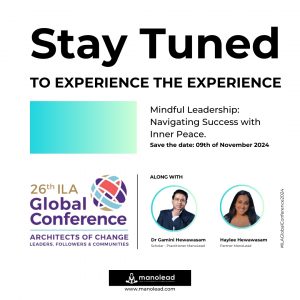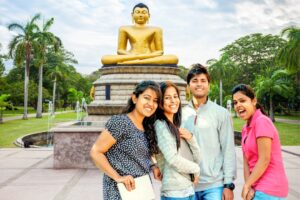26th ILA Global Conference 2024


Majority of youngsters today intend to migrate for studies and work but before leaving this country it is important to unlearn.
According to a research carried out on mental health; the mental health problems prevalent among adolescents in Sri Lanka is higher than the global average.
(Source: https://onlinelibrary.wiley.com/doi/full/10.1002/hsr2.886)

The research conducted also indicated that most of the upper grade students (grade 12-13) who are preparing for various competitive exams and university admission had higher mental problems. It is quite evident that youngsters are under immense pressure due to these competitive exams and the social structure that keeps them framed in a box. This webinar is primarily focused on breaking the children from this bond of thinking within a box.
Youngsters of Sri Lanka are highly talented individuals with very innovative ideas but unfortunately the educational system and the society has confined the youths to think within a box. So, this sytem of thinking within a box impedes growth potential and leads to many mental health problems.
One of the best ways to approach mental health problems is to approach it by looking within oneself. This webinar Facilites this by disucssing
1. What, why and how to unlearn
Unlearning is the art of removing the barriers placed on the youth from a very early stage and this webinar will discuss what unlearning is, how to unlearn and why to unlearn.
2. Be good over do good.
We are often taught to be good than do good. We often hear from our parents, elders, teachers, religious leaders to do good but what we actually need to do is to be good. Being good is an approach to start looking within as opposed to doing good which is from outside.

It is obvious that Sri Lanka is an unstable nation right now, and the country didn’t reach this position knowingly. It was the outcome of focusing on doing good than being good.
For a number of reasons, parents nowadays experience a lot of stress especially due to Sri Lanka’s economic situation after the covid pandemic and mismanagement of policies. As the country’s financial situation deteriorated, it became increasingly difficult for parents to financially and emotionally support their children and make decisions about their future due to the lack of proper guidance. Parents and their children are significantly impacted by Sri Lanka’s financial, social, economic, and health problems. So, picture the uncertainty each of us feels. We are all to blame for unintentionally causing this state of chaos.
According to the most recent WHO data on suicide fatality rates per 100,000 population in 2019, Sri Lanka ranked first in the WHO’s South East Asia Region, with 14 suicides per 100,000 inhabitants.

(Source : https://data.worldbank.org/)
The above graph indicates that Sri Lanka is on top when it comes to suicidal morality rate compared to other countries in the southeast asia region and this is an issue that needs to be addressed.

(Source : https://onlinelibrary.wiley.com/)
This webinar is being held to address the stress, despair, and several other challenges that parents are now dealing with by using a novel yet powerful strategy. We need to extend our perspective in order to address this circumstance, and we may do so by learning to unlearn.
It was also revealed in a research study that was conducted on mental health problems among adolescents in Sri Lanka that through increased parental and social engagements reported less suicidal ideas among the adolescents. So, it is quite evident that inorder to help the children the parents have to be taught to unlear too. This is another reason for the webinar to focus on the parents
(Source: https://onlinelibrary.wiley.com/doi/full/10.1002/hsr2.886)
By expanding our thoughts, we can find solutions to this issue, and we can do so by “unlearning.” Likewise emphasizing being good rather than doing good. We must also share this information with the following generation in order to break the harmful thought patterns we unintentionally picked up. This is what the webinar intends to achieve.
The webinar will discuss the following topics
1. How, why and what to unlearn
The human mind is filled with ideas but from a very early stage we are programmed to limit our thinking and hence we are not thinking outside the box. So, it is important to unlearn these teachings to broaden our mind and get a better perspective of how to deal with life.
2. The art of being good than doing good.
We are often taught to be good than do good. We often hear from our parents, elders, teachers, religious leaders to do good but what we actually need to do is to be good. Being good is an approach to start looking within as opposed to doing good which is from outside.
As it is no secret that the effectiveness of leadership can be a key determinant of the success of an organization, possessing relevant skills and capacities by those in leadership positions is tremendously important. In the recent times, organizations have been recognizing the significant positive effects the practice of mindfulness can have on one’s leadership skills and it is noted that organizations are investing substantial resources to facilitate the practice of mindfulness for their employees. While the mainstream practice of mindfulness can indeed bring benefits for leadership roles, it is only a part of the original practice of mindfulness (Hewawasam, 2022). A number of Western scholars have demonstrated the benefits of practicing the contemporary form of mindfulness, albeit with a limited and, in some instances, misguided understanding of the concept (Hewawasam, 2022). This shift in the understanding of the concept has been caused mainly due to mistranslation from Pali to English at the initial encounter with the concept of mindfulness of Buddhism in Sri Lanka in the 19th century by the British scholar T. W. Rhys Davids (1881, 1896, 1907), who introduced the concept to the Western world, and later by different interpretations by other parties based on their own mindsets. While the contemporary form of mindfulness can be beneficial, the original form of mindfulness which follows the Supernormal Eightfold Way found in early Buddhist teachings can deliver more wholesome benefits to the practitioners, enabling them to be supernormal leaders.
Research has demonstrated the effectiveness of introspection through the Supernormal Eightfold Way—a research involving a 3-month introspection workshop for 26 individuals who held high-level leadership positions in local and global corporations and academia (Hewawasam, 2022). Following the action research methodology, the research collected feedback from the participants (who were “knowledge agents” considering their capability to explain their thoughts, intentions, and actions (Gioia, 2012)) after each session to evaluate the effects of the practice (Hewawasam, 2022).
Some of the feedback received from participants which were submitted as journal entries (participants are identified in codes to preserve confidentiality):
My insights have started revealing the degree of selflessness mindfulness is offering me. I think more and more of others with every passing week. My increasing self-awareness has made my self-management more effective as I chose to make others a priority in my life. I thought I was doing this prior to these sessions but I realize I was largely focused on myself – even as I helped/supported others. These exercises have created a significant change in the way I prioritize the needs of others through my thoughts and behaviors. I’ve realized that I had a lot more self-doubt than I realized. I worried a lot because I didn’t trust enough. I am learning to give trust more freely. I feel, though my reflection, that I was forcing people to earn my trust, versus being vulnerable and freely giving it. Pain or betrayal of one should not impact another. I am learning to separate situations and give more to others. I continue to be more calm. I continue to listen more. My relationships are improving and my brand at work is strengthening. People are noticing my pace and my focus on them. People are asking what is different and if my job has changed as I seem happier! Being a mindful leader means understanding how to truly support others. How my pace, my anxiety, my talking vs listening impacts those around me. It means managing my thoughts and behaviors to serve others as much, if not more, than myself. A mindful leader cares for others and manages thyself to serve others.
Incorporating the lessons from the monks who shared so kindly and openly with us. I think one of the first things I say the first thing that comes to mind to leaders is to not be afraid of compassion.” The participant continues to further explain “So there’s a heartbreaking concept that leaders need to be in charge in control, to not show weakness. And one of the ways that that is exhibited is by having an aversion to compassion starting with compassion for oneself, the level of unspoken subconscious demands that are so prevalent in people’s minds encourages this, this pattern of constantly, people and organizations, and project teams having to prove themselves. And I say this slowly because it really hurts my heart.
It’s hard to think about the future, if you really aren’t connected with today. So that’s sort of one part of the frame. The other Part of the frame for me is allowing, again, it gets back to allowing others in. Because I know what I know, or think I know. And I can try to extrapolate that forward. But it’s not it’s not easy. So I bring others in, and practice, it’s not necessarily formal appreciative inquiry, but really get people to probe and ask questions, right. So that, you know, we grow out of curiosity together.
The concept of mindfulness as per early Buddhist teachings is based on a more wholesome approach known as the Supernormal Eightfold Way, and the original form of mindfulness can be more aptly translated as “introspection”. The original form of mindfulness (loosely translated from Satipatthāna or Samma Sati) is only an element (the seventh) in the process of the Supernormal Eightfold Way which is prescribed in early Buddhist teachings to enable people to achieve absolute calmness by eliminating cognitive dissonance and be supernormal (Hewawasam, 2022). Although the practice of introspection is based on early Buddhist teachings, it is important to note that one does not need to be a Buddhist to be a practitioner and enjoy the benefits of the practice.

This process of introspection based on the Supernormal Eightfold Way begins with harmonious perspective, in which one focuses attention within oneself instead of on outside. This involves thinking, feeling, and acting (Punnaji, 2021). This perspective is a way of thinking, different from the ordinary while incorporating a harmonious relationship with the reality of impermanence (Anicca), discomfort/anxiety/dissatisfaction/suffering (Dukkha), and the impersonality (Anatta) of all experience (Hewawasam, 2022). In early Buddhist teachings, this is expressed as the understanding of the Four Supernormal Realities (commonly translated as the Four Noble Truths)—suffering, cause of suffering, cessation of suffering, and the way leading to the cessation of suffering. The perspective involved in harmonious perspective identifies the emotional urges (e.g., desire for sensual pleasure, anger/hatred, and the delusion of “self” which are accompanied by uncomfortable bodily changes such as muscle tension) as the root cause of suffering and that these emotional urges will be gradually reduced and finally eliminated by achieving harmonious equilibrium. Essentially, harmonious perspective recognizes that suffering is the cause of stress.
After one achieves harmonious perspective, he/she is led to harmonious orientation or harmonious visualization where one gradually reorients one’s thinking to renounce seeking sensual pleasures, hatred, and vengeance. This reorientation leads to selfless, rational, and responsible speech, action, and lifestyle (known as Sîla in Pali) which are reflected in the stages of harmonious speech, harmonious action, and harmonious lifestyle of the Supernormal Eightfold Way. With the gradual development of Sîla, practitioners of introspection reach the harmonious exercise (removal of unwholesome thoughts that arise in the mind from external or internal sources), and then to harmonious attention (mindfulness) in which one is able to move away from emotionally disturbing thoughts and cognitive dissonance. Effective leaders who advocate mindfulness in organizations will greatly benefit from understanding the path to mindfulness involved in introspection since it provides a comprehensive approach to develop leadership skills that will contribute to higher employee morale and productivity which will enhance the bottom line. Mindfulness has been recognized for its effectiveness in leadership throughout corporate America—for example, 22% of Fortune 500 companies had implemented mindfulness practices within the workplace in 2016 (Wieczner, 2016). So, following the comprehensive approach to it can result in organization-wide benefits.
While understanding the importance of introspection is crucial, one may also benefit from understanding the mechanism behind this approach. Introspection is a method of learning to relax the tension consciously instead of releasing tension in action—one does not have to release one’s tensions by indulging in desires, eliminating the undesirable, or escaping from unpleasantness or anxiety (Hewawasam, 2022). Instead, through introspection, one can become aware of these tensions and, thereby, learn to relax the tensions. When the tensions are relaxed, a person becomes comfortable and happy. And in that calm, relaxed state, thinking becomes free from being clouded by emotional baggage. Calm, rational, responsible decision-making can happen in such a state. This is the critical benefit of the practice of mindfulness that is grounded in all eight steps of the Supernormal Eightfold Way for business leaders. That is also the reason for the existence of stress management for teaching people how to relax. While there are various techniques of relaxation, physical relaxation alone is not sufficient to achieve the wholesome state of being relaxed. As long as the cognitive and affective aspects are present, the circumstances are interpreted in ways that arouse emotions. As a result, tension is sustained.
The goal of introspection is to be in a state where tension is successfully removed and relaxation is sustained—i.e., harmonious equilibrium. This is a key aspect of maintaining wellness (physical, mental, social, and spiritual). As data shows, being in the state of harmonious equilibrium in leadership can have substantial benefits for the self, employees, and the overall organization. In order to achieve that state, it is essential to follow the Supernormal Eightfold Way as per the early Buddhist teachings, as it was observed within the participants whose leadership skills improved after completing the workshop, by covering the seven steps—not only the seventh step—of the Supernormal Eightfold Way.
As with almost any practice, mere knowledge of what it is does not suffice for successful practice of introspection. Cultivating the Supernormal Eightfold Way, which is the basis of the practice of introspection is accomplished in the original form of Buddhism through meditation (Hewawasam, 2022). A Buddhist meditator (based on original teachings) practices all eight steps of the Supernormal Eightfold Way to develop his/her consciousness to the highest possible level. This has been demonstrated by the four monks who conducted the workshop that was involved the research mentioned earlier. These four monks have cultivated the Supernormal Eightfold Way through meditation for more than X years. However, in the contemporary form of mindfulness, as noted earlier, the process of reaching calmness (harmonious equilibrium) starts with Satipatthāna. Most of the scholars on mindfulness, including Kabat Zinn (1994, 2003, 2015) and Langer (1989, 1992, 2000, 2014), have focused mainly on the seventh step of the Supernormal Eightfold Way when conducting research (Hewawasam, 2022). In order to achieve the eighth step, harmonious equilibrium, where overall calmness is reached, all seven steps are necessary as the research has demonstrated (Hewawasam, 2022).

The practice of achieving harmonious equilibrium through Satipatthāna and the other six steps was demonstrated in the workshop with participants from leadership positions with the help of four Buddhist monks in advanced stages of introspection (Hewawasam, 2022). This was not a mystical practice, and no religious aspects were involved. It was a practice of Satipatthāna and all previous steps of the Supernormal Eightfold Way for leaders who were living normal lives (and belonging to different faiths). As baseline data collected at the beginning of the research workshop showed, these participants needed to alleviate stress, worries, and anxieties of life and they were eager to enjoy peace of mind, healthy relationships, self-confidence, success in life, and efficiency at work. To them, this practice was about learning to gain control over the emotional disturbances that prevented them from thinking clearly or acting rationally. The early Buddhist meditation they experienced in the workshop by four Buddhist monks had helped the participants to free their minds of emotional disturbances and to think clearly and act rationally, which was evidenced by the participants’ journals. The workshop involved a systematic approach to consciously purifying the mind from impurities that arise from self-centered emotional states. When the mind is purified, inner happiness, physical comfort, kindness, and compassion are experienced to a great degree (Punnaji, 2021). The term “happiness” referred to in this case is not a state of emotional excitement but a tranquil and undisturbed state of mind, which is called “Piti Mannassa” in Pali. (Punnaji, 2021). Also, the abovementioned kindness and compassion are not based on attachment but on a state of unselfishness as opposed to emotional excitement. Therefore, happiness and kindness are attributes of the pure and tranquil mind (Punnaji, 2021).
Based on the data collected, the research has shown that the workshop on the original form of mindfulness had aided the participants to purify the mind and relax the body resulting in happiness, kindness, and mature intelligence. Since purification of the mind requires restraining one’s behavior in the form of discipline, which includes harmonious speech, action, and lifestyle, starting from step one of the eight-step Supernormal Eightfold Way is crucial in order to establish calmness, harmonious equilibrium, that can elevate a leader to be supernormal.